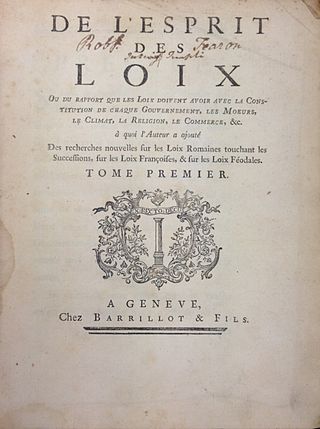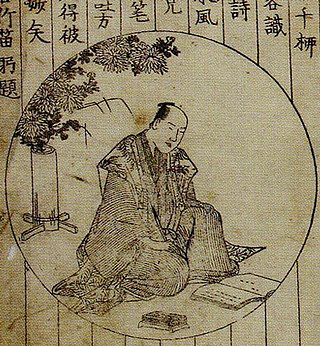This article needs additional citations for verification .(November 2013) |
| |||
|---|---|---|---|
| +... | |||
This article contains information about the literary events and publications of 1748.
This article needs additional citations for verification .(November 2013) |
| |||
|---|---|---|---|
| +... | |||
This article contains information about the literary events and publications of 1748.
See also 1748 in poetry

Denis Diderot was a French philosopher, art critic, and writer, best known for serving as co-founder, chief editor, and contributor to the Encyclopédie along with Jean le Rond d'Alembert. He was a prominent figure during the Age of Enlightenment.

Paul-Henri Thiry, Baron d'Holbach, known as d'Holbach, was a Franco-German philosopher, encyclopedist and writer, who was a prominent figure in the French Enlightenment. He was born Paul Heinrich Dietrich in Edesheim, near Landau in the Rhenish Palatinate, but lived and worked mainly in Paris, where he kept a salon. He helped in the dissemination of "Protestant and especially German thought", particularly in the field of the sciences, but was best known for his atheism, and for his voluminous writings against religion, the most famous of them being The System of Nature (1770) and The Universal Morality (1776).

Tobias George Smollett was a Scottish writer and surgeon. He was best known for writing picaresque novels such as The Adventures of Roderick Random (1748), The Adventures of Peregrine Pickle (1751) and The Expedition of Humphry Clinker (1771), which influenced later generations of British novelists, including Charles Dickens. His novels were liberally altered by contemporary printers; an authoritative edition of each was edited by Dr O. M. Brack Jr and others.
This article contains information about the literary events and publications of 1746.
This article contains information about the literary events and publications of 1747.
This article contains information about the literary events and publications of 1749.
This article contains information about the literary events and publications of 1751.
This article contains information about the literary events and publications of 1756.
This article contains information about the literary events and publications of 1757.
This article contains information about the literary events and publications of 1762.
This article contains information about the literary events and publications of 1771.

François-Vincent Toussaint was a French writer most famous for Les Mœurs. The book was published in 1748 and banned the same year; it was prosecuted and burned by the French court of justice.

The Spirit of Law, also known in English as The Spirit of [the] Laws, is a treatise on political theory, as well as a pioneering work in comparative law by Montesquieu, published in 1748. Originally published anonymously, as was the norm, its influence outside France was aided by its rapid translation into other languages. In 1750 Thomas Nugent published an English translation, many times revised and reprinted in countless editions. In 1751 the Roman Catholic Church added De l'esprit des lois to its Index Librorum Prohibitorum.
L'esprit de l'escalier or l'esprit d'escalier is a French term used in English for the predicament of thinking of the perfect reply too late.

Namiki Sōsuke, also known as Namiki Senryū, was a prominent Japanese playwright who wrote for both kabuki and bunraku. He produced around 47 bunraku plays, nearly 40 of them composed for jōruri, a particular form of musical narrative, and 10 kabuki plays. He is considered the second greatest Japanese playwright after Chikamatsu Monzaemon.
The Treasury of Loyal Retainers is an 11-act bunraku puppet play composed in 1748. It is one of the most popular Japanese plays, ranked with Zeami's Matsukaze, although the vivid action of Chūshingura differs dramatically from Matsukaze.

Jacob Vernet was a prominent theologian in Geneva, Republic of Geneva, who believed in a rationalist approach to religion. He was called "the most important and influential Genevan pastor of his day".

Essai sur les mœurs et l'esprit des nations is a work by the French writer, historian, and philosopher Voltaire, published for the first time in 1756. It discusses the history of Europe before Charlemagne until the dawn of the age of Louis XIV, also addressing the colonies and the East.
Joseph de La Porte, was an 18th-century French priest, literary critic, poet and playwright.

Charles Palissot de Montenoy was an 18th-century French playwright, admirer and disciple of Voltaire and Antoine de Rivarol. Paradoxically, he was often denounced as a Counter-Enlightenment opponent to the parti philosophique, especially for his criticism of Diderot and the Encyclopédistes. He is the author of the comedy, Les Philosophes, which was a huge success and caused a scandal in 1760.